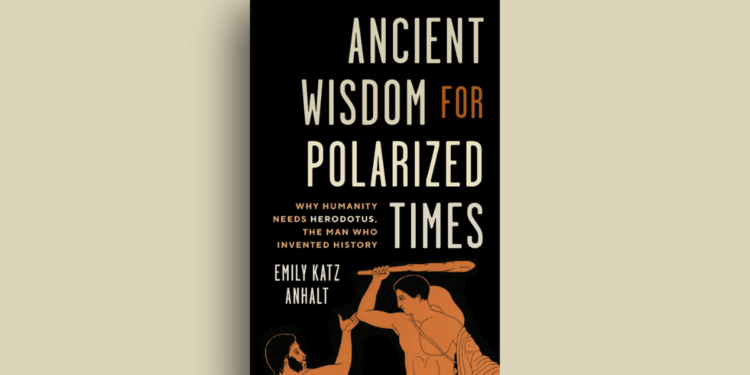Though ancient Greek historian Thucydides is arguably the father of political science, he was preceded on the scene by the father of history, Herodotus. Though some have called him the father of lies because of the tall tales he tells in his Histories, Herodotus’ account of the war between Greece and Persia marks the first attempt in the West to analyze battles, cultures, and political leaders in such a way as to construct a meaningful narrative that sheds light on the forces that propel history.
Though many have written on Herodotus, Emily Katz Anhalt, professor of classics at Sarah Lawrence College, empowers her readers to take the insights of the Histories and apply them to our own troubled times of political polarization, fake news, conspiracy theories, and media deception. In her book Ancient Wisdom for Polarized Times: Why Humanity Needs Herodotus, the Man Who Invented History, Anhalt uncovers the subtle patterns that Herodotus weaves through his history, patterns he likely meant as object lessons to his Athenian readers who were embarking on the disastrous Peloponnesian War, but which also have direct relevance today.
In diagnosing current problems, Anhalt thankfully steers clear of naming politicians on either side of the aisle. Her analysis is non-partisan and delves into the root causes of our fractured discourse:
In today’s volatile political environment, reality is under siege. Influential voices at all extremes of the political kaleidoscope—some cynical opportunists, some blinded by ideological certainties—craft narratives and interpretations drawn not from fact but from fantasy. Purveyors of falsehoods prey on human gullibility. … Extremists gain powerful support from anyone uninterested in learning facts or unwilling to moderate an opinion based on evidence and logic. Some argue that we are each entitled to our own reality, or that objective facts are inherently prejudicial, or that factual evidence is fake news. Captivated by misleading and demonstrably false narratives, we forfeit our capacity for compassionate, humane interactions and we imperil human survival itself.
What Herodotus offers to moderns trapped in such an environment is a method for assessing the past and the present that is grounded in evidence and the proper interpretation of that evidence. “Herodotus introduced the concept of objective truth, derived not from personal preference or authoritative pronouncement (whether by a political or divine authority) but from factual investigation and empirical deduction and analysis,” Anhalt notes. Though it is true that Herodotus includes fanciful stories and bizarre legends in his Histories, he also provides the necessary criteria for evaluating their veracity.
Whereas Homer’s Iliad and Odyssey and Hesiod’s Theogony and Works and Days begin with invocations of the muse, Herodotus writes on his own authority; indeed, the first word of his book is his name! Like Homer, he recounts memorable deeds, but he does so in a way that excludes the actions and interventions of the gods. Instead, he “concentrates on human conduct, beliefs, and choices and their consequences. Not divine but human behavior emerges as a potent force for change in human events.”
He also — and Professor Anhalt is to be commended for not critiquing Herodotus for this — does not offer reductive, materialistic, anti-humanistic explanations, but champions a Great Man view of history by which the decisions and actions of individual human beings drive historical action: “Uninterested in political or economic motives for military aggression, Herodotus … finds causal agency in human impulse or desire.”
Into Herodotus’ Mind
While Anhalt’s book is carefully researched and undergirded by an abundance of notes and a thorough bibliography, it is structured around a series of incisive, fully accessible close readings of key passages from Herodotus. She begins each chapter with her own literal, yet literary, translation of a passage from the Histories, and follows with an expository analysis of the passage that elicits its major themes and patterns.
She gets us into Herodotus’ mind and the way he sifts material evidence, eyewitness accounts, geographical and cultural observations, and heroic and cautionary tales to arrive at a logical assessment of how and why Greece and Persia fell into conflict and how and why the former was able, against all odds, to defeat the latter. She then ends each chapter by showing how her close reading is relevant for today.
In her early chapters, Anhalt recounts and examines five tales Herodotus tells about powerful but foolish barbarians (non-Greeks) who bring ruin upon themselves through lust, pride, and/or greed: King Candaules, who insists his bodyguard Gyges gaze in secret on the naked beauty of his queen, only to have queen and bodyguard conspire to assassinate him; a group of sailors who drown a man for his money, only to have him be rescued by a dolphin and expose their crime; Croesus, who interprets in his favor the Oracle of Delphi’s prophecy that if he fights Persia he will destroy a great nation, only to discover too late that the nation he was fated to destroy was his own; Astyages, who tries to prevent a dream from happening by attempting to kill his own grandson; Cyrus, the first King of Persia who, after a brilliant career, impulsively, and against all the oracles, attacks a fierce tribe of warriors, leading to his ignominious death.
Here is how Anhalt perceptively unpacks what Herodotus wants his readers to learn from these seemingly unrelated events, some of which are historical and others legendary. “For Herodotus, the human capacity for self-deception constitutes an unseen but determinative force in human life. Three powerful autocrats—Croesus, Astyages, Cyrus—deceive themselves into thinking that supernatural signs validate their desires and confer control over future events. … Nothing compels Croesus to attack Persia, Astyages to try to kill his grandson, or Cyrus to attack the Massegetai. They just want to,” she writes. “Lust for greater territory and power, like a king’s lust for his own wife [Candaules] or sailors’ greed for a passenger’s money, needs no further explanation. But self-deception feeds human appetites and makes supernatural signs worse than useless.”
The human propensity for self-deception is often highlighted in the Histories, a fatal flaw that can only be overcome by “self-reflection and self-restraint,” the very things that Herodotus’ barbarian autocrats lack. And yet, the Athenians are not above a little self-deception of their own. Three times, they are fooled into ceding power to the tyrant Peisistratus, a political trickster who does not destroy but delays the full flowering of Athenian democracy. In his retelling of the wiles of Peisistratus, Anhalt observes, “Herodotus directly connects deception with domination and credulousness with subjugation.”
As she does throughout her book, once Anhalt clarifies and articulates Herodotus’ warning, she applies it to our own propensity for self-deception: “Modern technology has made us not less but more vulnerable to authoritative trickery. Mainstream news sources and social media have trained many of us to seek—like Candaules and Croesus—not factual information but corroboration of our biases and assumptions.”
Why then, if the Greeks are as susceptible to deception as the barbarians, were they able to defeat the Persians? Because their sense of history and of the repeated patterns of cause and effect that connect one generation to the next empowered them to learn from the past. (Anhalt intriguingly argues that the Greek word for truth, aletheia, means “not forgetting.”)
Persian autocrats like Darius and Xerxes, on the other hand, refused to study, consider, or be instructed by past errors. “While discussion enables the Greeks to absorb facts and recognize wise counsel, the Persians ignore factual evidence and fail to learn from previous experience,” she notes. In his preparation for the decisive naval battle of Salamis, she further observes, “Persian king [Xerxes] makes unilateral decisions. He lacks discernment and access to dissenting opinions. He draws incorrect inferences from misleading external appearances. In contrast, Greeks benefit from constructive debate.”
Another way of saying this that most readers will recognize from their schooldays is that Xerxes falls prey to the consequences of hubris. However, whereas most of us were taught that hubris means overweening pride, Anhalt argues that “hubris in Greek meant excessive, unrestrained desire, ambition, and overconfidence. It frequently involved impulsive, short-sighted violence, specifically violence redounding to the harm of the perpetrator. … In Greek, the opposite of hubris is not ‘humility’ or ‘modesty’ but sōphrosunē, meaning ‘wisdom,’ ‘prudence,’ ‘self-restraint,’ ‘moderation,’ even ‘chastity.’ … [Hubris is that which] liberates the ruler’s most violent impulses and frees him to wreak havoc.” It makes him believe that he can, like the gods, fulfill his sexual lusts without consequences. So fall the tyrants of the earth.
A True Humanist
Although I found Ancient Wisdom for Polarized Times to be an entertaining and bracing, if at times repetitive, read, there were three aspects of it I found troubling.
First, Anhalt tries too hard to separate Herodotus from religion, as if she wants to secure him as a modern scholar living in Charles Taylor’s disenchanted cosmos. Second, while occasionally critiquing Herodotus and his fellow Greeks for seeing the world through the lens of Athenian exceptionalism, she takes for granted that the modern American near-worship of egalitarianism has somehow been proved to be superior to all other previous worldviews. Third, combining these two factors, she seems blissfully, or naively, unaware that while our modern, democratic notions of justice, equality, and freedom can (and should) be traced back to Athens, these notions would not have taken the form they have apart from the mediating influence of Christianity.
In another writer, these three idiosyncrasies might have stopped me from reading further. But not Anhalt. Never once does she come across as smug or condescending. Far from a resentful, virtue-signaling academic, she is a quaint, well-mannered daughter of the Enlightenment, a true heir of an older school of wise and judicious classicists that includes Michael Grant, Robert Graves, and Edith Hamilton. In a word, she is a true secular humanist who can profitably be read alongside Tom Holland, Douglas Murray, and Jonathan Haidt. Whereas most modern secular humanists are really secular anti-humanists, Anhalt upholds human dignity, celebrates human reason and volition, and treats virtue as a worthy goal grounded in absolute standards.
Her voice is a much-needed one in our fractured polity, and I hope she will get a wide reading. Above all, I hope she will follow up her analysis of Herodotus with a book on Thucydides that will help us wrestle with the political division and social unrest that plagues us today.

















